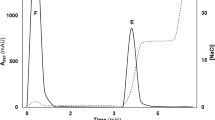Abstract
The objective of this study was to measure anticardiolipin antibodies in patients and healthy relatives in multicase families with schizophrenia. Twenty-eight (28) multicase families with schizophrenia were examined. One hundred three drug-free patients and 66 first-degree relatives consented to evaluation by DSM-III-R criteria. Criteria for patient definition included the following: age ≥16, a confirmed hospital diagnosis of schizophrenia, knowledge of biological parents, and consent to participate. Additional data were drawn from family history and medical records. Serum samples were tested separately for IgG and IgM anticardiolipin by enzyme-linked immunosorbent assay (ELISA) and designated positive/negative by comparison to the reactivity of an age-matched control group. IgG anticardiolipin antibodies were significantly more common in both patients and relatives compared to controls. IgM anticardiolipin antibodies were significantly more common in patients. In 75% of families at least one member was anticardiolipin positive and this positivity correlated with patient positivity. The relevance of anticardiolipin antibodies in both patients and healthy relatives of some multicase families to the pathogenesis of schizophrenia is discussed.
Similar content being viewed by others
References
Sirota P: Is schizophrenia an autoimmune disease? Isr J Med Sci 26:694–697, 1990
Sirota P, Firer MA, Schild K, Zurgil N, Barak Y, Slor H: (1993). Anti-Sm antibodies are elevated in patients with schizophrenia and their first degree relatives. Prog Neuropharm Biol Psychiat (in press)
Sirota P, Firer MA, Schild K, Amir T, Avner E, Meytes D, Slor H: Autoantibodies to DNA in multicase families with schizophrenia. Biol Pysch 33:450–455
Ganguli R, Rasin BS, Kelly RH: Multiple autoantibodies and autoimmune disease in schizophrenic patients: Evidence for an autoimmune pathogenesis. In Interactions Among CNS, Neuroendocrine and Immune Systems, JW Hadden, K Masek, G Nistico (eds). Pythagora Press, 1989, p 365
Zarrabi MH, Zucker S, Miller F: Immunologic and coagulation disorders in chlorpromazine treated patients. Ann Intern Med 91:194–196, 1979
Von Brauchitsch H: Antinuclear factor in psychiatric disorders. Am J Psychiat 128:4552–4555, 1972
Harris EN, Asherson RA, Hughes GRV: Antiphospholipid antibodies: Autoantibodies with a difference. Annu Rev Med 39:261–267, 1988
Alarcon-Segovia D: Pathogenic potential of antiphospholipid antibodies. J Rheumatol 15:890–893, 1989
Sammaritano LR, Gharavi AG, Lockshin MD: Antiphospholipid syndrome: Immunological and clinical aspects. Semin Arth Rheum 20:81–88, 1990
McNeil HP, Hunt JE, Krilis SA: Antiphospholipid antibodies—new insights into their specificity and clinical importance. Scand J Immunol 36:647–652, 1992
Asherson RA: Antiphospholipid antibodies and “syndromes”: Many questions and few answers. Isr J Med Sci 26:284–286, 1990
Canoso RT, Sise HS: Chlorpromazine-induced lupus anticoagulant and associated immunologie abnormalities. Am J Haematol 113:121–125, 1982
Manoussakis MV, Gharavi AE, Droses AA, Kitridou RG, Moutsopoulas HM: Anticardiolipin antibodies in unselected autoimmune rheumatic disease patients. Clin Immunol Immunopathol 44:297–303, 1987
Manoussakis MN, Tzioufas AG, Silus MP, Pange PJE, Goudevenbos J, Moutsopoulos HM: High prevalence of anti-cardiolipin and other autoantibodies in healthy elderly patients. Clin Exp Immunol 69:557–563, 1987
Yannitsi SG, Manoussakis MN, Mavridis AK: Factors related to the presence of autoantibodies in patients with chronic mental disorders. Biol Psychiat 27:747–751, 1990
Canoso RT, de Oliveira RM, Nixon RA: Neuroleptic-associated autoantibodies. A prevalence study. Biol Psychiat 27:863–888, 1990
Chengappa KNR, Carpentor AB, Keshavan MS, Yang ZW, Kelly RH, Rabin BS, Ganguli R: Elevated IgG and IgM anticardiolipin antibodies in a subgroup of medicated and unmedicated schizophrenics. Biol Psychiat 30:731–735, 1991
Evaes L, Schulz SC, Sharp R: Genetics, immunology and virology. Schizo Bull 14:305–311, 1988
American Psychiatric Association: Diagnostic and Statistical Manual of Mental Disorders (ed 3 rev) (DSM-3-R). APA, Washington, DC, 1987
Endicott J, Spitzer R: A diagnostic interview: The schedule for affective disorders and schizophrenia. Arch Gen Psychiat 35:837–844, 1979
Firer MA, Spivak T, Shoenfeld Y, Slor H: The effect of incubation temperature and coating procedure on the measurement of antibodies to cardiolipin. J Immunol Methods 143:31–38, 1991
Harris EN: The Second International Anti-Cardiolipin Standardization Workshop/The Kingston Anti-Phospholipid Antibody Study (KAPS) Group. Am J Clin Pathol 94:476–484, 1990
Zucker S, Zarrabi MH, Romano GS, Miller F: IgM inhibitor of the contract activation phase of coagulation in chlorpro-mazine-treated patients. Br J Haematol 40:441–445, 1978
Rotrosen J, Nolkin A: Phospholipid and prostaglandin hypothesis of schizophrenia. In Psychopharmacology: The Third Generation of Progress, HV Meltzer (ed). New York, Raven Press, 1987, p 759
Keshavan MS, Pettegren JW, Panchalingam K: In vivo 31P nuclear magnetic resonance (NMR) spectroscopy of the frontal lobe metabolism in neuroleptic-naive first episode psychoses. Preliminary studies. Schizo Res 2:122, 1989 (abstr)
McNeil HP, Hunt JE, Krillis SA: New aspects of anticardiolipin antibodies. Clin Exp Rheumatol 8:525–527, 1990
Tomer Y, Buskila D, Shoenfeld Y: Pathogenic significance and diagnostic value of lupus autoantibodies. Int Arch Allergy Immunol 100:293–306, 1993
McNeil HP, Simpson RJ, Chesterman CN, Krillis SA: Antiphospholipid antibodies are directed against a complex antigen that includes a lipid-binding inhibitor of coagulation: Beta-2-glycoprotein 1 (apolipoprotein H). Proc Natl Acad Sci USA 87:4120–4124, 1990
Galli M, Comfurius P, Maassen C: Anticardiolipid antibodies (ACA) directed not to cardiolipin but to a plasma protein cofactor. Lancet 336:177–178, 1990
Harris EN, Pierangeli S, Barquinero J, Ordi-Ros J: Anticardiolipin antibodies and binding of anionic phospholipids and serum protein. Lancet 336:505–506, 1990
Gharavi AE, Sammaritano LR, Morse JH, Zarrabi MH, Lockshin MD: Binding characteristics of HIV and chlorpromazine-induced anti-phospholipid antibodies. Arth Rheum 36:R34, 1993
Author information
Authors and Affiliations
Rights and permissions
About this article
Cite this article
Firer, M., Sirota, P., Schild, K. et al. Anticardiolipin antibodies are elevated in drug-free, multiply affected families with schizophrenia. J Clin Immunol 14, 73–78 (1994). https://doi.org/10.1007/BF01541177
Accepted:
Issue Date:
DOI: https://doi.org/10.1007/BF01541177




